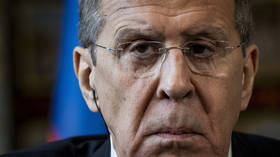Argentina opts out of BRICS

Argentina has formally rejected an invitation to become a member of the BRICS group of nations, several news media outlets reported on Friday, citing an official letter they have seen which has been sent to the leaders of Russia, China, India, Brazil and South Africa. While President Javier Milei had previously voiced his opposition to joining the alliance before being elected, the move represents a complete U-turn from the policy of his predecessor, Alberto Fernandez.
Fernandez had accepted the invitation to join the five-nation group in August, holding that such a move would offer the Latin American nation a “new scenario” for its development. Milei, who won the presidency in November, said at that time that he would not “push for deals with communists because they don’t respect the basic parameters of free trade, freedom, and democracy.”
One of Buenos Aires’ letters was published by media on Friday and apparently addressed Brazilian President Luiz Inacio Lula da Silva. It said that the policy of the new Argentinian government would “differ in many cases from that of the previous government” and that some of its decisions, including “active participation in BRICS,” would be “reviewed”. None of the BRICS nations so far has officially confirmed receiving the letter.
Argentina’s foreign minister Diana Mondino, who previously served as Milei’s senior economic adviser, also said that her government did not “see any advantage” in becoming a member of the group and would thus “not join BRICS.”
The letter stated at the same time that Milei’s government plans to “intensify” bilateral ties with BRICS members, particularly in the fields of trade and investments. Earlier, the president said that, although he was not going to “align with the communists,” his government would still not prevent the Argentinian private sector from doing business with “whoever it wants.”
The South American nation is currently struggling with its worst economic crisis in decades. Inflation has surged 160% over the past year alone. The severely devalued peso forced the country to refinance its $44-billion debt to the IMF. Milei’s government is also facing massive protests over its radical deregulation and austerity-based reform program.
In total, more than 40 countries have so far expressed interest in joining BRICS, according to current group chair South Africa. Starting January 1, the association will be joined by Egypt, Ethiopia, Iran, the UAE and Saudi Arabia.
Russia will hold the presidency of BRICS in 2024. The nation’s priorities during its chairmanship would include further expansion of the “circle of BRICS friends” to include Latin America countries, as well as an increase in trade settlements using national currencies, Deputy Foreign Minister Sergey Ryabkov said in October.













